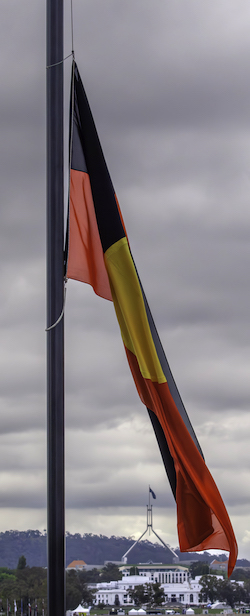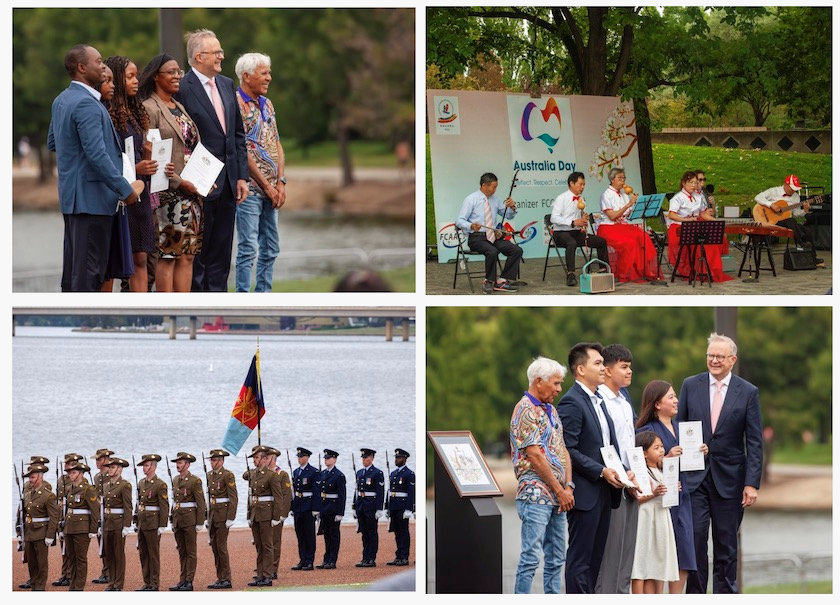January 26 – shades of meaning
A cycle ride around the national capital

Andrew Bolt has described the 26 January celebrations as “the wokest Australia Day ceremony Canberra has held”. Even before the day was over he was able to report that “a culture of hatred and division has exploded under Albanese’s leadership, and things got worse for him during that disastrous weekend”.
I spent the morning of 26 January cycling around Lake Burley Griffin and the Parliamentary triangle, looking for the excitement: if there was something happening, I didn’t want someone like Bolt to be the only one enjoying the action.
Alas, what I came across was a dignified Australia Day citizenship ceremony, presided by Governor-general Sam Moyston and Prime Minister Anthony Albanese, with all the usual military trappings.
It was, in all senses of the term, a “welcome to country” for 16 people from 10 countries. Bolt must have seen something I didn’t, or maybe he found those army uniforms a bit woke and effeminate.
Up the hill there were the remnants of a small rally held at the Aboriginal Tent Embassy. Around the lawns there were gatherings of families and groups of friends picnicking – not much sign of “hatred and division”, and notably unwoke. My last encounter was with a band from the ACT Federation of Chinese Associations, playing The Road to Gundagai.
Many Australians attach a particular sacredness about the date. But contrary to the weirdest interpretations of history, Governor Phillip didn’t step ashore at Sydney Cove on January 26, 1788, and declare it to be “Australia day”.
In fact in 1788 the name “Australia” had not even made its way into Wikipedia. Flinders coined the name 16 years later. Nor did he claim the whole continent for the British crown. He claimed only about half of the continent: the Spanish, the Portuguese or some other European power could have everything west of Streaky Bay, including the iron ore.

January 26 around Lake Burley Griffin
NITV has a short history about what happened in January 1788, and historian Michelle Arrow, President of History at Macquarie University gives us a history of the significance of January 26. January 26 emerges as a firm date some time in the 1960s, and it was only about this period that the name “Australia Day”, rather than “Foundation Day” or “Anniversary Day”, became established.
From those historical accounts, it’s clear that as a day to remember, January 26 has particular meaning for aboriginal Australians. That’s the day their country was invaded by settlers. In terms of significance for other Australians who want to celebrate the birth of a nation, there are options, including Federation Day January 1, or perhaps February 7, the day the colony of New South Wales was formally proclaimed with Phillip as Governor. February 7 should have some appeal for those who would like a longer summer break.
Support for having a national day on some date other than January 26 rises and falls. Because responses vary depending on the way survey questions are framed the numbers move around a bit. Writing in The Conversation, Deakin University historians draw attention to survey data showing that support for the proposition “We should not celebrate Australia Day on 26 January” is fairly steady at about 40 percent. Polling by Resolve Strategic, reported by SBS, finds lower support for changing the date, and that support has fallen over the last two years.
But the main finding from the Deakin research is that support for changing the date is quite strong among young people. Just as Empire Day (May 24) faded away as a day for Australians to celebrate, we can expect to see growing support for some day other than January 26 to become a national holiday.
The date of our national day isn’t carved in stone. So why is Dutton suggesting January 26 should be set in legislation as our national day? There is no argument in public policy, or even in the Liberal Party’s platform for such a move. It’s simply one of his provocations: if he finds an issue on which there is some difference of opinion, where there is quiet and respectful disagreement, he will provoke disagreeing parties to a polarized conflict – and then claim that others – the “woke left” probably – are dividing the country. The tactic works only if people take the bait: “just chill out” is Albanese’s wise response to Dutton.